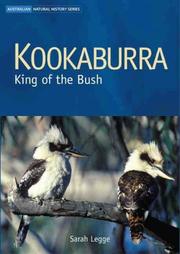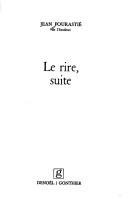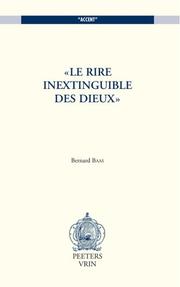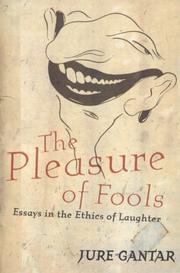| Listing 1 - 10 of 77 | << page >> |
Sort by
|
Dissertation
Abstract | Keywords | Export | Availability | Bookmark
 Loading...
Loading...Choose an application
- Reference Manager
- EndNote
- RefWorks (Direct export to RefWorks)
Anesthesia. --- Fysostigmine. --- Laughing gas.
Book
Year: 1967 Publisher: Leiden : Brill,
Abstract | Keywords | Export | Availability | Bookmark
 Loading...
Loading...Choose an application
- Reference Manager
- EndNote
- RefWorks (Direct export to RefWorks)
Laughing gull. --- Birds --- Instinct. --- Behavior.
Book
Year: 1985 Publisher: Washington, DC : National Coastal Ecosystems Team, Division of Biological Services, Research and Development, Fish and Wildlife Service, U.S. Department of the Interior,
Abstract | Keywords | Export | Availability | Bookmark
 Loading...
Loading...Choose an application
- Reference Manager
- EndNote
- RefWorks (Direct export to RefWorks)

ISBN: 1283154366 9786613154361 0643091378 9780643091375 9781283154369 0643090630 9780643090637 Year: 2004 Publisher: Collingwood, Vic. CSIRO Pub.
Abstract | Keywords | Export | Availability | Bookmark
 Loading...
Loading...Choose an application
- Reference Manager
- EndNote
- RefWorks (Direct export to RefWorks)
A complete overview of Kookaburras and their unique place in Australian culture and natural history.
Kookaburra --- Dacelo gigas --- Dacelo novaguineae --- Kinghunter --- Laughing jackass (Bird) --- Laughing kookaburra --- Dacelo

ISBN: 2282203011 9782282203010 Year: 1983 Volume: vol *5 Publisher: Paris Denoël/Gonthier
Abstract | Keywords | Export | Availability | Bookmark
 Loading...
Loading...Choose an application
- Reference Manager
- EndNote
- RefWorks (Direct export to RefWorks)
Laughter --- Laughing --- Emotions --- Nonverbal communication --- Wit and humor --- Rire --- Lachen.
Book
ISBN: 0429900406 0429475632 1782410856 9781782410850 9781299538887 1299538886 9781781812174 1781812179 9780429914638 0429914636 178049095X 9781780490953 9780429475634 9780429928864 Year: 2013 Publisher: London : Karnac,
Abstract | Keywords | Export | Availability | Bookmark
 Loading...
Loading...Choose an application
- Reference Manager
- EndNote
- RefWorks (Direct export to RefWorks)
"While living in anti-Semitic Vienna, Freud wrote in a letter to Ernest Jones, 'What progress we are making. In the Middle Ages they would have burned me. Now they are content with burning my books.' Tragicomic attunement-seeing the comic in the tragic and the tragic in the comic-is a perspective on life that, following Freud, is one of the best ways to 'to ward off possible suffering' and better manage the stressors, anxieties, and worries of everyday life. Moreover, tragicomic attunement and intervention has a meaning-giving, affect-integrating, life-affirming, double structure that is especially pertinent to sensible living in our troubled and troubling post-modern world: 'In tragedy', said theologian Harvey Cox, 'we weep and are purged. In comedy we laugh and hope.' In Monty Python's Life of Brian, a bunch of crucified criminals happily sing 'Always Look on the Bright Side of Life'; In Stephen King's book The Tommyknockers, the central character thinks about a joke he heard once. As a man is about to be executed, the firing squad officer in charge offers the man about to be shot a cigarette. He replies, 'No thanks, I'm trying to quit.' It is precisely this capacity to use one's imaginative resources to create a tragicomic 'form of life', a way of thinking, feeling, and acting in the service of aesthetic, epistemological, and ethical deepening, of affirming Beauty, Truth and, especially, Goodness, that mainly constitutes the art of living the 'good life.' In chapters on love, work, suffering, death, and psychoanalysis, the author shows how the 'nuts and bolts' of tragicomic attunement and intervention can be cultivated and used to help people better manage the harshness, if not outrageousness, of life, as well as more deeply engage its beauty and nobility. Unlike most books on the psychology and philosophy of humour, and following Ludwig Wittgenstein's wonderful advice-'A serious and good philosophical work could be written consisting entirely of jokes,' this book is replete with jokes, humorous stories, and amusing maxims and quotes making it a lively reading experience that aims to help people fashion the 'good life'-a life of deep and expansive love, creative and productive work, that is aesthetically pleasing and in accordance with reason and ethics. As tragicomic master Mel Brooks noted, 'Life literally abounds in comedy if you just look around you,' and becoming more attuned to its dynamics and applications in everyday life is the art of living the 'good life'."--Provided by publisher.
Laughter --- Laughing --- Emotions --- Nonverbal communication --- Wit and humor --- Therapeutic use.
Book
ISBN: 3110664038 3110667762 Year: 2019 Publisher: Berlin ; Boston : De Gruyter,
Abstract | Keywords | Export | Availability | Bookmark
 Loading...
Loading...Choose an application
- Reference Manager
- EndNote
- RefWorks (Direct export to RefWorks)
Das Lachen ist zwar seit Aristoteles als Wesensmerkmal des Menschen anerkannt und wurde doch in der christlich geprägten Gelehrtenkultur marginalisiert und dämonisiert. Diese Ausgrenzungsgeschichte ist noch bis ins 21. Jh. daran erkennbar gewesen, dass es keine einzige Überblicksdarstellung zum vielgestaltigen Phänomen gab, während die Theologie um das Lachen entweder einen großen Bogen machte oder es nur im sittsamen Gewand des Humors in seine heiligen Hallen hineinließ. Die vorliegende Studie stößt in dieses Vakuum hinein, indem sie dem Phänomen zunächst in seinem ungeheuren kultur- und geistesgeschichtlichen Facettenreichtum auf den Grund geht und in einem zweiten Schritt die Bedeutung des Lachens für den christlichen Glauben reflektiert. Vor dem Hintergrund der traditionellen heilstheologischen Verfemung des Lachens erinnert sie an den Reichtum einer versunkenen christlichen Lachkultur und versucht sich an einer Rehabilitierung und Neubestimmung der geheimnisvollen Äußerungsform. Damit leistet sie nicht nur einen wichtigen Beitrag zur anthropologischen Vermessung des Phänomens, sondern skizziert darüber hinaus Deutungsansätze für eine zeitgemäß leibfreundliche, diesseitsorientierte und skeptische Theologie. Since the time of Aristotle, laughter has been widely appreciated as a key characteristic of being human, but in Christian culture and intellectual history, laughter has had a poor reputation and regarded as an unfathomable phenomenon. In an interdisciplinary study, theologian, and German scholar Max Lühl explores the multifaceted nature of this mysterious phenomenon and redefines the significance of laughter for Christian faith.
Laughter --- Religious aspects --- Christianity. --- Body. --- Crisis. --- Devil. --- Laughing.

ISBN: 9042912642 2877237044 Year: 2003 Publisher: Leuven Peeters
Abstract | Keywords | Export | Availability | Bookmark
 Loading...
Loading...Choose an application
- Reference Manager
- EndNote
- RefWorks (Direct export to RefWorks)
Depth psychology --- Laughter --- Laughing --- Emotions --- Nonverbal communication --- Wit and humor --- Philosophy

ISBN: 1282863509 9786612863509 0773572856 9780773572850 9780773528925 077352892X 9781282863507 6612863501 Year: 2005 Publisher: Montreal [Que.] McGill-Queen's University Press
Abstract | Keywords | Export | Availability | Bookmark
 Loading...
Loading...Choose an application
- Reference Manager
- EndNote
- RefWorks (Direct export to RefWorks)
The crucial question is not whether or not there is offensive laughter but whether or not all laughter offends. Almost everyone has felt the bitter stab of malicious laughter and knows that laughter can be cruel, but it is more difficult to decide if there is also laughter that can never insult. Through a reading of Aristophanes, Rabelais, Molière, Fielding, and Rostand, Victorian nonsense poetry, and the philosophical texts of Plato, Dante, and More, Gantar explores the reasons for critics' prejudice against comedy, the specific position of laughter in various utopian societies, and self-deprecating laughter and the role of the comedian as its primary producer. His conclusions contradict basic postmodern thought and contribute to current debates on the epistemological nature of criticism.
Laughter in literature. --- Laughter --- Laughing --- Emotions --- Nonverbal communication --- Wit and humor --- Moral and ethical aspects.
Book
ISBN: 1283639394 1442217588 9781442217560 1442217561 9781442217584 9781283639392 Year: 2012 Publisher: Lanham, Md. Rowman & Littlefield Publishers
Abstract | Keywords | Export | Availability | Bookmark
 Loading...
Loading...Choose an application
- Reference Manager
- EndNote
- RefWorks (Direct export to RefWorks)
In Shocked But Connected, distinguished filmmaker Michael Roemer reflects on the nature of comedy and laughter. Incorporating the work of both the great thinkers and great comedians of our age, Roemer investigates what makes us laugh and what distinguishes comedy from all other art forms.
Comic, The. --- Wit and humor --- Laughter. --- Laughing --- Emotions --- Nonverbal communication --- Ludicrous, The --- Ridiculous, The --- Comedy --- Philosophy.
| Listing 1 - 10 of 77 | << page >> |
Sort by
|

 Search
Search Feedback
Feedback About UniCat
About UniCat  Help
Help News
News